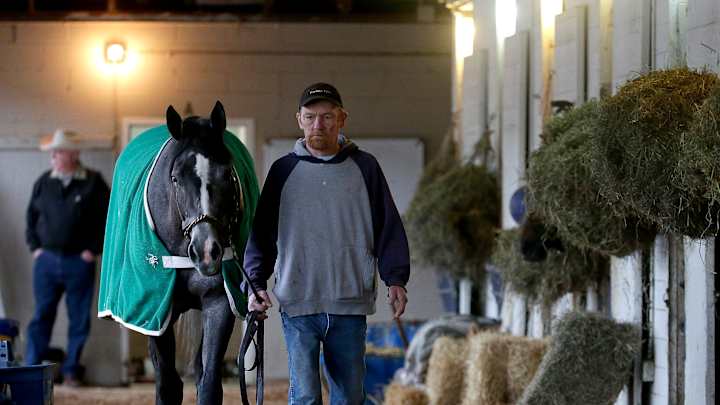Life on backside far from glamour of Churchill grandstand

LOUISVILLE, Ky. (AP) Life on the backside at Churchill Downs seems a world away from the glamour of the grandstand. This is what happens behind the scenes through the eyes of one hot-walker:
--
Mike Wells leads sleek thoroughbreds on leisurely walks to cool them down after workouts. His workdays start before dawn, seven days a week. The wiry-framed, 55-year-old handles powerful animals with minds of their own. But he takes pride in being part of a team that prepares horses to reach racetracks in prime condition.
EARLY RISER
Wells is up before 4 a.m. in his tiny room in a Churchill Downs dormitory where he lives for free, an important perk considering he clears $217 a week. The communal bathroom is down the hall. He skips breakfast and arrives at his trainer's barn around 5 a.m. He checks the workout schedule, then empties and cleans feed tubs and water buckets before starting his main chore.
TAKING A STROLL
Wells walks several miles a day without leaving the barn. Once a horse returns from on-the-track workouts, Wells takes his place beside it, always to its left. He lets the horses set the pace as he guides them around the barn for a half-hour. He talks to them like pets and gets to know their habits and moods. Horses come and go, but he still gets attached to them. A 3-year-old gelding named Medal of Courage playfully nibbles at Wells' cap before they begin their walking ritual around the barn.
''They're individuals, just like us,'' he said. He stops by a stall where Mizz Money, a 3-year-old filly, leans her head out to be patted.
''This is why I do it,'' he said.
HARDSCRABBLE LIFE
''This is not an easy life; it's not for everybody,'' he said, sitting on a haybale and sipping a mid-day beer. By 11 a.m, his workday is usually over. He usually drinks a beer, grabs lunch and takes a nap.
Backside workers are employed by trainers, not the tracks. It can be a nomadic life, the pay is low and he doesn't take time off. A few years ago, his right foot was broken when a horse stepped on him. He wrapped it up and was back at the barn the next day. ''In this industry, we call it `cowboying up,''' he said. ''That means you go to work. Whatever it takes, you've got to do your job.''
